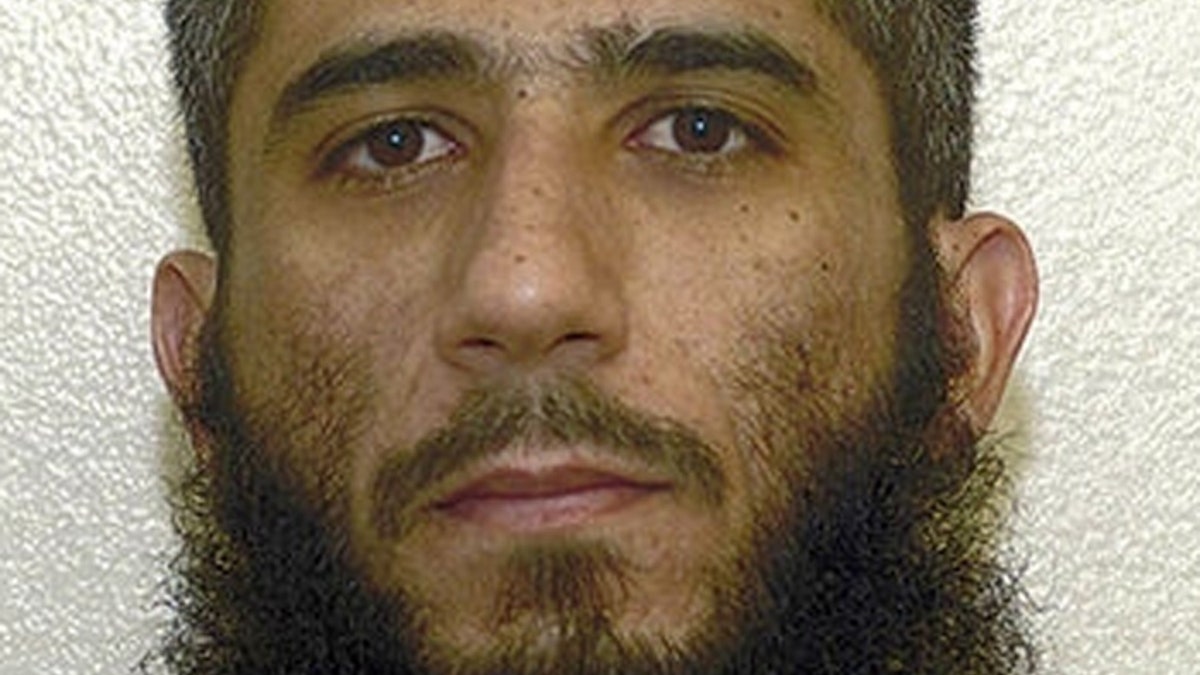
Faiz Mohammed Ahmed al Kandari was transferred to his homeland of Kuwait on Jan. 8.
A Gitmo detainee dubbed dangerous as recently as a year ago and once suspected of acting as Usama bin Laden's "spiritual adviser" was released to Kuwait last week, as Obama continues to empty out the military prison -- leaving some defense experts convinced alleged Al Qaeda members will return to the battlefield.
The U.S. Defense Department announced last week the repatriation of Faez Mohammed Ahmed al Kandari -- a 38-year-old Kuwaiti held at Guantanamo for 13 years and a suspected Al Qaeda propagandist believed to an influential religious figure for bin Laden and his followers in Afghanistan, according to a department profile.
The Defense Department said in a statement that his detention "does not remain necessary to protect against a continuing significant threat to the security of the United States."
Kandari was transferred on Friday to his native Kuwait, where he will be put into a rehabilitation program to help him reintegrate into society, according to his lawyer in Washington, Eric Lewis.
"Mr. Al Kandari is delighted to be going home and reuniting with his beloved parents and family after all these years away," Lewis told Reuters.
Kandari is one of a handful of detainees to be released from the Guantanamo Bay prison camp in Cuba within the last week, bringing the number of prisoners at the U.S. military base to 103.
President Obama campaigned in 2008 on a pledge to close Gitmo, and, as his presidency enters its seventh year, the number of prison transfers has accelerated. Obama has argued the facility is an egregious symbol of inmate abuse and detention without charge and one he plans to close -- despite strong opposition from a Republican-controlled Congress. The prison camp was established by his predecessor, former President George W. Bush, after the Sept. 11, 2001, attacks terror attacks.
Many defense experts argue that the transfer of terror suspects, like Kandari, to their homelands ensures "without a doubt" their return to a radicalized life aimed at harming the U.S. and its allies.
"The likelihood of their returning to jihadism is extraordinary high," said Gen. Jack Keane, a retired four-star general and a Fox News contributor.
"When the number [of inmates] dropped below 200, most people know we're dealing with hardcore, true believers not prone to be rehabilitiated," Keane, former vice chief of staff of the U.S. Army, told FoxNews.com Wednesday.
Kandari was assessed to be a committed member of Al Qaeda who served as adviser and confidant to 9/11 mastermind Usama Bin Laden, according to U.S. officials. He also provided ideological education to trainees of the terrorist network at the al-Faruq Training Camp and the Islamic Institute in Kandahar.
Kandari, who was captured while he was heading down the Tora Bora Mountains into Pakistan, was first detained in Jalalabad before he was was transferred to Gitmo in May 2002. In 2008, he was assessed to be a "high risk" to the U.S., its interests and allies, according to the Defense Department.
For many defense experts, Kandari's release is reminiscent of Abdallah Saleh Ali Al Ajmi, a Kuwaiti citizen held at Gitmo who was eventually released back to the Gulf nation, where he was tried and acquitted. In March 2008, a few months after his release, Al Ajmi drove a truck bomb into a compound in Mosul, killing 13, including himself, and wounding 43.
The attack was later praised by Al Qaeda in a propaganda video and described by one soldier who witnessed it as looking like the 1995 Oklahoma City bombing.
"Kuwait is far from an ideal partner on counter-terrorism issues," said Ryan Mauro, national security analyst from the Washington, D.C.-based Clarion Project.
"The administration's own officials have blasted Kuwait for giving a permissive environment to terrorists waging jihad in Syria," Mauro told FoxNews.com. "In 2014, one Treasury Department official publicly said, 'Our ally Kuwait has become the epicenter of fundraising for terrorist groups in Syria.'"
"Why would the U.S. trust a government known for allowing a permissive environment for jihadists in Syria with hosting a former Gitmo detainee who would undoubtedly be interested in the jihad in Syria?" questioned Mauro.
A parole-style Periodic Review Board determined in September that Kandari's detention was no longer needed. Obama created the board -- made up of six intelligence and national security agencies -- in 2011. Once prisoners are approved for transfer, the U.S. government must find countries willing to accept them and offer security -- a plan defense experts, like Keane, have roundly criticized.
"There is tremendous pressure on the Department of Defense," said Keane. "Even when they [Defense officials] vote them down as a 'no' for transfer, the White House pushes them again weeks later to put them through the screening test again."
"The transfer makes no sense whatsoever to people familiar with them," Keane said of the inmates recently released from Gitmo.
"There is no monitoring system that the country is going to use and in most cases there is no travel restriction," he said.




